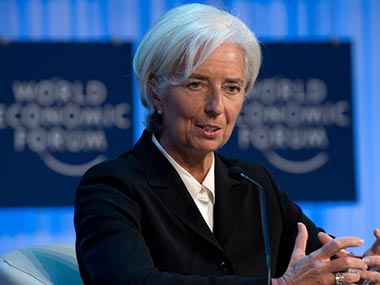Christine Lagarde, managing director of the International Monetary Fund (IMF), issued a statement at the end of the recent G20 meeting in Ankara in Turkey. G20 is essentially an organisation of the governments along with their central banks of the twenty major economies (19 countries plus the European Union) of the world. The finance ministers and the central bank governors of these countries along with those of the European Union, meet regularly “to discuss ways to strengthen the global economy”, among other things. [caption id=“attachment_1519571” align=“alignleft” width=“380”]  IMF chief, Christine Lagarde. AFP[/caption] At the end of the summit in Ankara, Lagarde of IMF said: “The G20 meeting took place at a time of renewed uncertainty for the global economy…The major challenge facing the global economy is that growth remains moderate and uneven. For the advanced economies, activity is projected to pick up only modestly this year and next…A concerted policy effort is needed to address these challenges, including continued accommodative monetary policy in advanced economies.” What Lagarde meant in simple English is that global economic growth continues to remain slow. And given that central banks of Western economies need to continue doing what they have been since late September 2008 – i.e., print money and maintain low interest rates. The term “accommodative monetary policy” is essentially a euphemism for printing money to maintain low interest rates. The hope is that people will borrow and spend more at low interest rates, and economic growth will return. But that really hasn’t happened. A significant portion of this printed money has found its way into financial markets around the world, leading to bubbles. Now Lagarde wants central banks to carry out more of the same. Nevertheless, the fundamental problem with the developed countries still remains. As Raghuram Rajan and Luigi Zingales write a new after¬word to Saving Capitalism from the Capitalists: “For decades before the financial crisis in 2008, advanced economies were losing their ability to grow by making useful things.” Further, as Thomas Piketty points out in Capital in the Twenty First Century, between 1900 and 1980, 70–80 percent of the global production of goods happened in the United States and Europe. By 2010, this share had declined to around 50 percent, around the same level it was at in 1860. This has led to loss of jobs and a slow economic growth through much of the Western world. This phenomenon played out over a period of time. The Western governments and central banks tackled this by following an easy money policy, where they kept interest rates low and made borrowing easier for citizens. As Rajan and Zingales write: “They needed to somehow replace the jobs that had been lost to technology and foreign competition… So in an effort to pump up growth, governments spent more than they could afford and promoted easy credit to get households to do the same. The growth that these countries engineered, with its dependence on borrowing, proved unsustainable.” All this easy money ended up causing the financial crisis which started in September 2008. And now Lagarde wants the Western world to do more of the same. The Western world is likely to follow this, given that there is a great belief in central banks being able to engineer growth. The trouble is that the basic issue discussed earlier, which is at the heart of low economic growth through much of the developed world, is something that central banks cannot do anything about. Further, printing money in order to maintain low interest rates, in the hope of people borrowing and spending, can never lead to sustainable economic growth. As James Rickards writes in The Big Drop—How to Grow Your Wealth During the Current Collapse: “Investors and the Fed [the Federal Reserve, the American central bank] have been expecting another strong expansion since 2009, but it has not materialized. Growth today isn’t strong because the problem in the economy is not monetary, it is structural.” This means economic growth cannot be created simply by maintaining low interest rates. Along with the Federal Reserve, other central banks through much of the developed world also believe that they will be able to engineer economic growth. But things have changed at the ground level. The sooner, the IMF and the Western central banks understand this, the better it is going to be for all of us. (Vivek Kaul is the author of the Easy Money trilogy. He tweets @kaul_vivek)
What IMF chief Christine Lagarde meant in simple English is that global economic growth continues to remain slow.
Advertisement
End of Article


)

)
)
)
)
)
)
)
)



